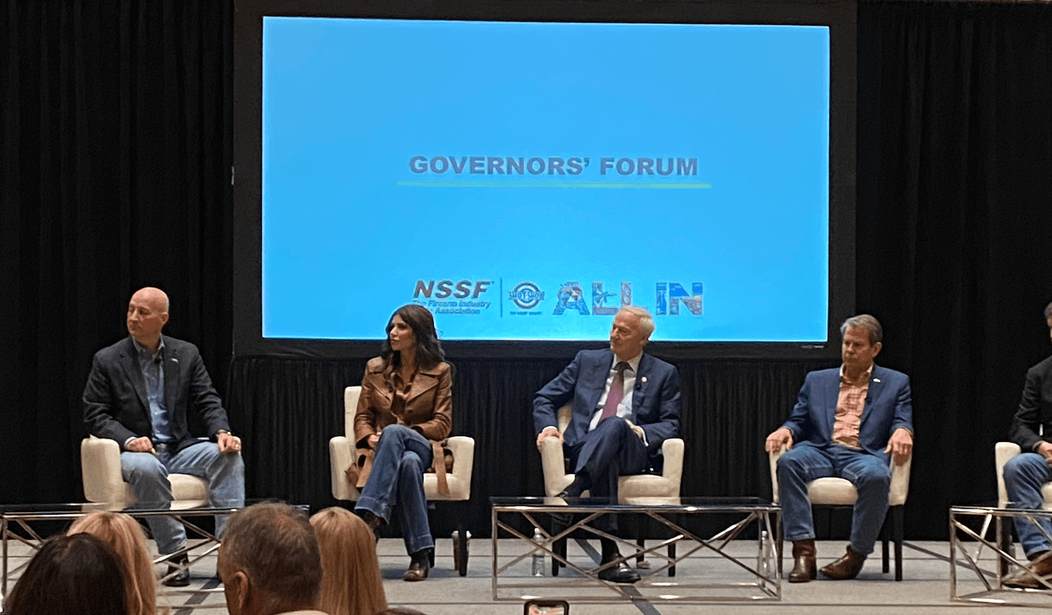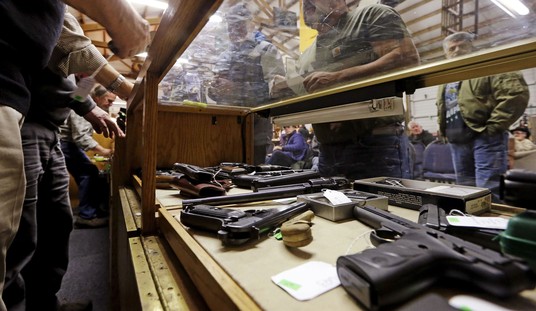While the main thrust of the Shooting, Hunting, Outdoor Trade show are the products on display, the yearly gathering of the firearms and outdoors industry also features a range of seminars and other programs designed to help educate and inform industry members, and on Wednesday afternoon a half-dozen Republican governors sat down for an hour-long question and answer session that proved enlightening on a couple of different issues.
One of the questions posed to Alaska Gov. Mike Dunleavy, Wyoming Gov. Mark Gordon, Georgia Gov. Brian Kemp, South Dakota Gov. Kristi Noem, Arkansas Gov. Asa Hutchinson, and Nebraska Gov. Pete Ricketts had to do with the anti-firearms industry policies put in place by many large financial institutions and what states can do to push back.
The National Shooting Sports Foundation’s senior vice president and general counsel Lawrence Keane, who moderated the discussion, mentioned the new law in Texas that’s designed to block anti-gun banks from taking part in the state’s massive municipal bond market, and asked the assembled governors if they felt it was their job to push back against the “woke capitalism” being practiced by companies like JPMorgan and Bank of America.
All of the governors on stage agreed that it was, with Georgia Gov. Brian Kemp referencing the decision by Major League Baseball to pull the All-Star Game out of Atlanta over the state’s election integrity law as an example of how corporate activists try to punish those they disagree with, and noted that the state and elected officials weren’t afraid to call out MLB for its attempt to bully lawmakers into submission.
It’s a lesson the firearms industry needs to take to heart, according to Kemp, who declared “we cannot let people be targeted for being supporters of the Second Amendment. That’s one of things this country was built on,” to applause from attendees.
Arkansas Gov. Asa Hutchinson concurred, noting that these banks may have an international footprint and “global pressure” being applied to them that might make it difficult for a consumer-driven grassroots campaign to successfully counter their anti-gun policies. As governor, however, Hutchinson says that he and his colleagues are in a position to fight back and push back “to make sure that we’re protecting those businesses that stand strong for the Second Amendment and make sure that those firearm products are available to the public.”
Wyoming’s Mark Gordon pointed out that these types of anti-gun corporate policies are nothing new, but the consolidation of the banking industry has made the problem much worse. What’s more, these examples of corporate wokeness are now going beyond the firearms industry and touching many other areas of the economy, which led Gordon to call for governors to continue to push back against federal overreach and to restore the powers of the states reserved to them under the 10th Amendment. Last year Gordon signed into law a bill that specifically bars banks from discriminating against the industry and allows for civil suits to be brought against financial institutions that violate state law, so it was noteworthy that he acknowledged that legislation is just one piece of what he believes should be a much broader response.
While Texas has moved to limit anti-gun banks from bidding on municipal bonds, Alaska’s Mike Dunleavy took things one step further and said states should also divest these institutions from state-managed funds as well.
Nebraska Gov. Pete Ricketts concurred, but said that one of the biggest problems we have in this country is that “the CEOs of this country need to start growing a spine.”
When the applause greeting his remark quieted down, the governor added that one of the things that will help counter the culture of woke capitalism is for states to get engaged, and like Gordon, he pointed out that the problems are coming from the bigger banks with national charters, not the community banking industry with state charters. For Ricketts, the response to those gigantic financial institutions trying to freeze out the firearms industry is simple: “if you won’t do business with them, we don’t do business with you.”
Unlike Hutchinson, who indicated that consumers alone might not be able to sway a company like Bank of America, Ricketts also called on gun owners to boycott any financial institution that discriminates against gun companies and put their money in local banks instead.
I was glad to see that all of the governors participating in the NSSF forum not only recognized that these anti-gun banks and their discriminatory policies are a real problem, but that they are part of a real solution. So far we’ve only had a handful of states like Texas and Wyoming take legislative action to address the issue, but based on what we heard on Wednesday afternoon, I expect those states are just the pioneers, and several more states are likely to follow.








